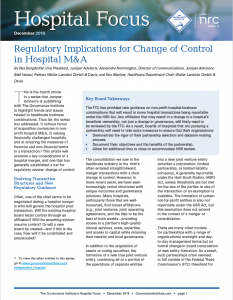Regulatory Implications for Change-of-Control
Often, one of the chief terms to be negotiated during a hospital merger is who will govern the hospital post transaction. Will the existing hospital board retain control through an affiliation? Will the acquiring system assume control? Or will a new board be created—and if this is the case, how will it be constituted and perpetuated?
The consolidation we saw in the healthcare industry in the 1990’s often entailed straightforward merger transactions with a clear change in control. However, in more recent years, we have seen increasingly varied structures with unique outcomes and governance solutions. Many hospitals, particularly those that are well resourced, find looser affiliations (e.g., joint ventures, joint operating agreements, and the like) to be the best of both worlds—providing access to a partner’s high-quality clinical services, scale, expertise, and access to capital while retaining their identity and local governance.
The Federal Trade Commission (FTC) has provided new guidance on non-profit hospital business combinations that will result in more hospital transactions being reportable under the Hart-Scott-Rodino Act (HSR). Any affiliation that may result in a change in a hospital’s beneficial ownership, not just a change in governance, will likely now need to be reviewed by the FTC.
As a result, boards of hospitals that are pursuing a partnership will need to take extra measures to ensure that their organizations:
• Demonstrate the rigor of their partnership selection and decision-making process.
• Document their objectives and the benefits of the partnership.
• Allow for additional time to close to accommodate HSR review.
